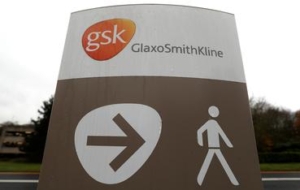International
Study confirms GSK-Vir antibody drug reduces hospitalization, death in Covid-19 patients
GlaxoSmithKline and Vir Biotechnology said final results from a late-stage study of their monoclonal antibody confirmed sotrovimab significantly reduced hospitalization and death among high-risk Covid-19 patients when given early in the disease.

Study confirms GSK-Vir antibody drug reduces hospitalization, death in COVID-19 patients
June 21, 2021; 8:27 AM EDT
(Reuters) – GlaxoSmithKline Plc (GSK.L) and Vir Biotechnology (VIR.O) said on Monday final results from a late-stage study of their monoclonal antibody confirmed it significantly reduced hospitalization and death among high-risk COVID-19 patients when given early in the disease.
The treatment, sotrovimab, received an emergency use authorization from the U.S. Food and Drug Administration in May, while the European Union’s drug regulator has also backed it. read more
The drugmakers also said on Monday the U.S. National Institutes of Health (NIH) has recommended sotrovimab to treat high-risk, non-hospitalized patients with mild-to-moderate COVID-19.
The treatment appeared to “retain activity” against current variants of concern and interest, the agency said in its updated guidelines.
In a study of 1,057 patients, sotrovimab resulted in a 79% reduction in risk of hospitalization for more than 24 hours or death due to any cause, the companies said on Monday.
FILE PHOTO: A GlaxoSmithKline (GSK) logo is seen at the GSK research centre in Stevenage, Britain November 26, 2019. REUTERS/Peter Nicholls/File Photo
Sotrovimab belongs to a class of drugs called monoclonal antibodies that mimic the natural antibodies the body generates to fight off infection.
Similar therapies developed by rivals Regeneron (REGN.O) and Eli Lilly (LLY.N) have been approved by U.S. regulators for treating non-hospitalized COVID-19 patients.
GSK said it was now testing sotrovimab as an intramuscular shot, which is more convenient than by intravenous drip, the current mode of administration.
Vir’s shares rose about 2% in premarket trading, while GSK’s stock was flat.
Our Standards: The Thomson Reuters Trust Principles.
Reuters source:
International
You can now enter this country without a passport
Singapore has been on a larger push to speed up the flow of tourists with digital immigration clearance.

In the fall of 2023, the city-state of Singapore announced that it was working on end-to-end biometrics that would allow travelers passing through its Changi Airport to check into flights, drop off bags and even leave and exit the country without a passport.
The latter is the most technologically advanced step of them all because not all countries issue passports with the same biometrics while immigration laws leave fewer room for mistakes about who enters the country.
Related: A country just went visa-free for visitors with any passport
That said, Singapore is one step closer to instituting passport-free travel by testing it at its land border with Malaysia. The two countries have two border checkpoints, Woodlands and Tuas, and as of March 20 those entering in Singapore by car are able to show a QR code that they generate through the government’s MyICA app instead of the passport.
Here is who is now able to enter Singapore passport-free
The latter will be available to citizens of Singapore, permanent residents and tourists who have already entered the country once with their current passport. The government app pulls data from one's passport and shows the border officer the conditions of one's entry clearance already recorded in the system.
More Travel:
- A new travel term is taking over the internet (and reaching airlines and hotels)
- The 10 best airline stocks to buy now
- Airlines see a new kind of traveler at the front of the plane
While not truly passport-free since tourists still need to link a valid passport to an online system, the move is the first step in Singapore's larger push to get rid of physical passports.
"The QR code initiative allows travellers to enjoy a faster and more convenient experience, with estimated time savings of around 20 seconds for cars with four travellers, to approximately one minute for cars with 10 travellers," Singapore's Immigration and Checkpoints Authority wrote in a press release announcing the new feature. "Overall waiting time can be reduced by more than 30% if most car travellers use QR code for clearance."
More countries are looking at passport-free travel but it will take years to implement
The land crossings between Singapore and Malaysia can get very busy — government numbers show that a new post-pandemic record of 495,000 people crossed Woodlands and Tuas on the weekend of March 8 (the day before Singapore's holiday weekend.)
Even once Singapore implements fully digital clearance at all of its crossings, the change will in no way affect immigration rules since it's only a way of transferring the status afforded by one's nationality into a digital system (those who need a visa to enter Singapore will still need to apply for one at a consulate before the trip.) More countries are in the process of moving toward similar systems but due to the varying availability of necessary technology and the types of passports issued by different countries, the prospect of agent-free crossings is still many years away.
In the U.S., Chicago's O'Hare International Airport was chosen to take part in a pilot program in which low-risk travelers with TSA PreCheck can check into their flight and pass security on domestic flights without showing ID. The UK has also been testing similar digital crossings for British and EU citizens but no similar push for international travelers is currently being planned in the U.S.
stocks pandemic link testing singapore uk euSpread & Containment
This country became first in the world to let in tourists passport-free
Singapore has been on a larger push to speed up the flow of tourists with digital immigration clearance.

In the fall of 2023, the city-state of Singapore announced that it was working on end-to-end biometrics that would allow travelers passing through its Changi Airport to check into flights, drop off bags and even leave and exit the country without a passport.
The latter is the most technologically advanced step of them all because not all countries issue passports with the same biometrics while immigration laws leave fewer room for mistakes about who enters the country.
Related: A country just went visa-free for visitors with any passport
That said, Singapore is one step closer to instituting passport-free travel by testing it at its land border with Malaysia. The two countries have two border checkpoints, Woodlands and Tuas, and as of March 20 those entering in Singapore by car are able to show a QR code that they generate through the government’s MyICA app instead of the passport.
Here is who is now able to enter Singapore passport-free
The latter will be available to citizens of Singapore, permanent residents and tourists who have already entered the country once with their current passport. The government app pulls data from one's passport and shows the border officer the conditions of one's entry clearance already recorded in the system.
More Travel:
- A new travel term is taking over the internet (and reaching airlines and hotels)
- The 10 best airline stocks to buy now
- Airlines see a new kind of traveler at the front of the plane
While not truly passport-free since tourists still need to link a valid passport to an online system, the move is the first step in Singapore's larger push to get rid of physical passports.
"The QR code initiative allows travellers to enjoy a faster and more convenient experience, with estimated time savings of around 20 seconds for cars with four travellers, to approximately one minute for cars with 10 travellers," Singapore's Immigration and Checkpoints Authority wrote in a press release announcing the new feature. "Overall waiting time can be reduced by more than 30% if most car travellers use QR code for clearance."
More countries are looking at passport-free travel but it will take years to implement
The land crossings between Singapore and Malaysia can get very busy — government numbers show that a new post-pandemic record of 495,000 people crossed Woodlands and Tuas on the weekend of March 8 (the day before Singapore's holiday weekend.)
Even once Singapore implements fully digital clearance at all of its crossings, the change will in no way affect immigration rules since it's only a way of transferring the status afforded by one's nationality into a digital system (those who need a visa to enter Singapore will still need to apply for one at a consulate before the trip.) More countries are in the process of moving toward similar systems but due to the varying availability of necessary technology and the types of passports issued by different countries, the prospect of agent-free crossings is still many years away.
In the U.S., Chicago's O'Hare International Airport was chosen to take part in a pilot program in which low-risk travelers with TSA PreCheck can check into their flight and pass security on domestic flights without showing ID. The UK has also been testing similar digital crossings for British and EU citizens but no similar push for international travelers is currently being planned in the U.S.
stocks pandemic link testing singapore uk euGovernment
Analysts issue unexpected crude oil price forecast after surge
Here’s what a key investment firm says about the commodity.

Oil is an asset defined by volatility.
U.S. crude prices stood above $60 a barrel in January 2020, just as the covid pandemic began. Three months later, prices briefly went negative, as the pandemic crushed demand.
By June 2022 the price rebounded all the way to $120, as fiscal and monetary stimulus boosted the economy. The price fell back to $80 in September 2022. Since then, it has bounced between about $65 and $90.
Over the past two months, the price has climbed 15% to $82 as of March 20.
Bullish factors for oil prices
The move stems partly from indications that economic growth this year will be stronger than analysts expected.
Related: The Fed rate decision won't surprise markets. What happens next might
Vanguard has just raised its estimate for 2024 U.S. GDP growth to 2% from 0.5%.
Meanwhile, China’s factory output and retail sales exceeded forecasts in January and February. That could boost oil demand in the country, the world's No. 1 oil importer.
Also, drone strokes from Ukraine have knocked out some of Russia’s oil refinery capacity. Ukraine has hit at least nine major refineries this year, erasing an estimated 11% of Russia’s production capacity, according to Bloomberg.
“Russia is a gas station with an army, and we intend on destroying that gas station,” Francisco Serra-Martins, chief executive of drone manufacturer Terminal Autonomy, told the news service. Gasoline, of course, is one of the products made at refineries.
Speaking of gas, the recent surge of oil prices has sent it higher as well. The average national price for regular gas totaled $3.52 per gallon Wednesday, up 7% from a month ago, according to the American Automobile Association. And we’re nearing the peak driving season.
Another bullish factor for oil: Iraq said Monday that it’s cutting oil exports by 130,000 barrels per day in coming months. Iraq produced much more oil in January and February than its OPEC (Organization of Petroleum Exporting Countries) target.
Citigroup’s oil-price forecast
Yet, not everyone is bullish on oil going forward. Citigroup analysts see prices falling through next year, Dow Jones’s Oil Price Information Service (OPIS) reports.
More Economic Analysis:
- Bond markets tell Fed rate story that stocks still ignore
- February inflation surprises with modest uptick, but core pressures ease
- Vanguard unveils bold interest rate forecast ahead of Fed meeting
The analysts note that supply is at risk in Israel, Iran, Iraq, Libya, and Venezuela. But Saudi Arabia, the UAE, Kuwait, and Russia could easily make up any shortfall.
Moreover, output should also rise this year and next in the U.S., Canada, Brazil, and Guyana, the analysts said. Meanwhile, global demand growth will decelerate, amid increased electric vehicle use and economic weakness.
Regarding refineries, the analysts see strong gains in capacity and capacity upgrades this year.
What if Donald Trump is elected president again? That “would likely be bearish for oil and gas," as Trump's policies could boost trade tension, crimping demand, they said.
The analysts made predictions for European oil prices, the world’s benchmark, which sat Wednesday at $86.
They forecast a 9% slide in the second quarter to $78, then a decline to $74 in the third quarter and $70 in the fourth quarter.
Next year should see a descent to $65 in the first quarter, $60 in the second and third, and finally $55 in the fourth, Citi said. That would leave the price 36% below current levels.
U.S. crude prices will trade $4 below European prices from the second quarter this year until the end of 2025, the analysts maintain.
Related: Veteran fund manager picks favorite stocks for 2024
stimulus economic growth pandemic dow jones stocks fed army trump gdp stimulus oil iran brazil canada european russia ukraine china-

 Spread & Containment1 week ago
Spread & Containment1 week agoIFM’s Hat Trick and Reflections On Option-To-Buy M&A
-

 Uncategorized4 weeks ago
Uncategorized4 weeks agoAll Of The Elements Are In Place For An Economic Crisis Of Staggering Proportions
-

 International2 weeks ago
International2 weeks agoEyePoint poaches medical chief from Apellis; Sandoz CFO, longtime BioNTech exec to retire
-

 Uncategorized1 month ago
Uncategorized1 month agoCalifornia Counties Could Be Forced To Pay $300 Million To Cover COVID-Era Program
-

 Uncategorized4 weeks ago
Uncategorized4 weeks agoApparel Retailer Express Moving Toward Bankruptcy
-

 International2 weeks ago
International2 weeks agoWalmart launches clever answer to Target’s new membership program
-

 Uncategorized1 month ago
Uncategorized1 month agoRFK Jr: The Wuhan Cover-Up & The Rise Of The Biowarfare-Industrial Complex
-

 Uncategorized1 month ago
Uncategorized1 month agoGOP Efforts To Shore Up Election Security In Swing States Face Challenges





















